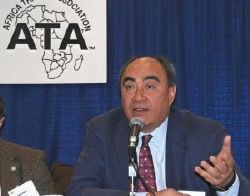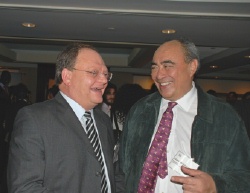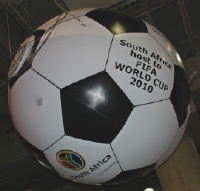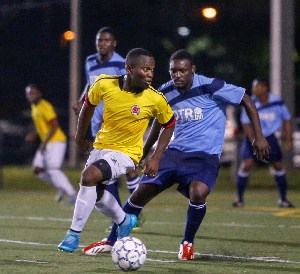2010 World Cup should benefit host communities
NEW YORK – South Africa is set to host the “most successful” FIFA World Cup and development specialists want to ensure the benefits of the world’s largest sporting event can be spread to communities.
Gert Oosthuizen, South Africa’s Deputy Minister of Sport and Recreation, recently told participants at the first US-Africa Tourism and Sports Seminar held at the Jacob K. Javits Convention Center in New York that preparations for the 2010 World Cup are “ahead of schedule” and South Africa “will deliver the best technologically advanced FIFA World Cup ever”.
The World Cup, added the South African Minister, will showcase the best in infrastructure, including roads, telecommunications, broadband technology and accreditation systems. “Africa’s time has indeed come,” he told conference delegates, declaring that the Cup, which is already fueling the local economy, will be a success.

Lelei LeLaulu addresses the Africa Travel Association seminar in New York
Development specialist Lelei LeLaulu lauded South Africa’s preparations for the World Cup and supports the Minister’s contention that it will be a commercial success. “But I hope the government’s excellent hosting of the 2002 World Summit on Sustainable Development will also remind them of the importance of ensuring sports tourism revenues also benefit South African communities.”
“We in the development community are heartened by the South African Government’s commitment to bettering the lives of its communities through sports tourism,” asserted LeLaulu, president of the non-profit development agency Counterpart International which implements programs in several African countries, “and we know they will make a huge effort to ensure those languishing in poverty will benefit from the financial success of the FIFA World Cup.”
The sport’s organizing body, FIFA, he urged, should make “community benefit” a prerequisite for countries bidding to host future World Cups: “After all, they have environmental requirements, so why not community benefit requirements?”

Counterpart International’s Lelei LeLaulu (right) shares a light moment with Gert Oosthuizen, South Africa’s Deputy Minister of Sport and Recreation.
“For a start, FIFA should call for the building of multi-use stadia incorporating religions, sports, recreational, educational and even residential properties. It is time to halt the construction of white elephants,” asserted LeLaulu, adding “that’s one type of elephant we should certainly be culling on the continent.”
“The rest of Africa should also benefit from the World Cup,” declared LeLaulu, a co-founder of the World Tourism Forum for Peace and Sustainable Development, who urged other African nations to “start preparing packages to attract tourists to stay in your countries for a few days before or after the Cup. This will be the first and probably the last trip to Africa for many people attending the tournament so they will be looking to make the most of their trip.”
LeLaulu, a member of the Global Sustainable Tourism Alliance set up by the United States Agency for International Development (USAID), also called for other African nations to temporarily adapt their visa requirements and accept visitors with South African visas for periods before and after the World Cup.
Eddie Bergman, executive director of the African Travel Association which hosted the seminar in conjunction with the New York Times Travel Show, said the wealth of information exchanged at the inaugural conference indicated there was demand for annual sessions on the topic.
For more than 42 years, Counterpart International has given people a voice in their own future through smart partnerships, offering options and access to tools for sustained social, economic and environmental development.

South Africa to host 2010 FIFA World Cup



